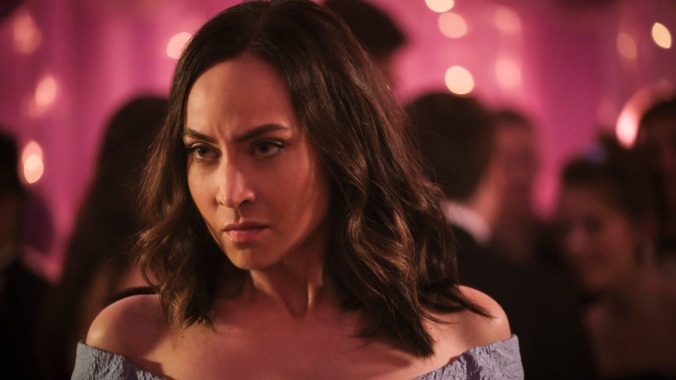A terrific Legends Of Tomorrow reminds us it’s the smartest dopey show on TV

There’s a scene in “The Other Woman,” one of many excellent episodes of Mad Men, that works a very specific kind of wizardry. It’s the scene in which Peggy quits. (Yes, I am comparing Legends Of Tomorrow to Mad Men, and I have no regrets.) Watch those few minutes and you’ll see two people dealing very specifically with the thing that is happening to them right then—it’s all what’s happening in the moment. Negotiation, manipulation, honesty, clarity, defense, gratitude—all part of navigating a tricky personal and professional moment in a personal and professional relationship. But it is, mostly wordlessly, also evoking many other moments in the story of those characters and that relationship. It’s the scene in which Peggy quits, but it’s also a scene from the pilot, a scene from “The Suitcase,” a scene from the hospital. It’s immediate and it’s history, all in one.
Legends Of Tomorrow is not Mad Men; its aspirations are entirely different. But the show with the voltron Beebo and Zaricat and film student George Lucas and special guest star John Noble has that one thing in common with Matthew Weiner’s masterpiece. (Okay, two things.) And in its way, it’s equally as subtle—while the parallels and connections may be underlined with a thicker pen, they announce themselves slyly. In one hand, it’s got Mick’s flame-thrower Ray’s Chicago fandom and references to Romy & Michelle’s High School Reunion, and it waves that hand back and forth with cheerful insouciance. In the other, it’s got the trauma, heartbreak, confusion, passion, love, loss, and despair its characters have experienced in their lives, placed carefully behind its back, ready to draw them out just when you’re least prepared.
So, greetings, and welcome to Legends Of Tomorrow, the show that wraps an ’80s slasher homage around a story of one traumatized, angry kid being counseled by a woman who was once much the same. It’s so good at being dopey and ridiculous that its sleight of hand is incredibly effective: One minute you’re giggling about the score, the ponies, and “promo code: laceration,” and the next, you’re suddenly in a place you didn’t know you were always headed. It’s nice in here, and they have snacks. Well, crudités. But the broccoli’s spoken for.
After its surprisingly dark, straightforward cold-open, “Slay Anything” moves in a fashion familiar to anyone who’s been watching this show for a while. We’re introduced to the subplots—Constantine leaving the ship to try to sort out the Astra situation, where he’ll “need to walk alone, with Gary,” Zari locked up in the brig, Nora’s frustration with her new gig—and then an alert that tells us what the A-story is going to be. This episode’s “encore” is not a historical figure, but is instead a pile of horror tropes rolled up inside a jumpsuit and stuffed under a mask. (That is not a complaint.) The Prom Night Slasher, Ava delightedly steals Gideon’s thunder to inform us, is one Freddy Meyers (bless), who killed seven of his fellow students on prom night in 1989 with a kitchen knife while wearing a mask. He was executed by the state and now his body’s missing and he’s on the lam. Please leave StabCast a review on iTunes.
Ray’s advice to Constantine earlier this season comes into play right quick—it’s time to try reforming the encores before their souls are condemned to hell. It’s the Legends as the Soul Squad. (This is not the first time it has seemed that Legends Of Tomorrow exists in The Good Place universe.) In this case, it’s a test that arises out of necessity, when the killer uses their new, hell-granted power of telekinesis to lock all the doors to the school from the outside. Episode writers Tyron B. Carter and Matthew Maala continue to pull from Carrie and many other horror classics, but they also trot out tropes from and references to other high school stories, from Napoleon Dynamite to Footloose.
All in all, it recalls no episode of this show so much as “Wet Hot American Bummer,” a terrific fourth-season outing that also plays with horror tropes but centers on even younger youngsters. (Carter is also a credited co-writer on that one.) Like that episode, this one eventually lands on something deeply personal to one of the characters, and does so in a way that feels totally organic. In that story, it was Ava’s anxiety, insecurity, shame and grief about her past (or lack thereof) that served as the episode’s emotional engine. Here, it’s the story of Nora Darhk (Courtney Ford, as good as she’s ever been), whose inconceivable childhood trauma made her a monster, but who is no longer. And then, when the admittedly pretty predictable twist is revealed, it shifts again, because the killer Nora Darhk is also the daughter of a murderous parent whose love for her didn’t stop him from being a force of unbelievable darkness.
